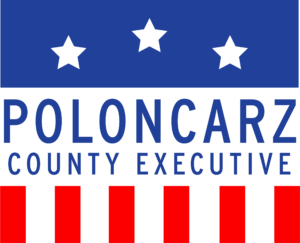By Donn Esmonde
I am glad to hear that Mark Poloncarz will hire a lawyer to carry the community’s flag in lease talks with the Bills. The county executive told The News he wants someone “who can learn the [lease] agreement inside and out.”
Studying every crossed ‘t’ and dotted ‘i’ of the current lease is well and good. But tight-focusing only on this lease, this team and this stadium is to my mind a recipe for taxpayer disaster.
The parameters of this negotiation do not end at the county line. A new lease, stadium improvements and the limited leverage the county has are only understood in the wider context of the NFL. With all due respect, that is not something a private attorney brings to the table.
To truly protect taxpayer backs in this deal, the county needs to bring in a sports economist who knows the lay of the NFL land. It needs a hired gun familiar with recent or pending deals in, among other places, Jacksonville, Minnesota and Cincinnati. It needs someone who knows the pecking order of cities that covet teams and how to best tie the Bills to Buffalo. The people sitting with Ralph Wilson will know every rut and rock of that landscape.
The Bills likely want upwards of $100 million in taxpayer-funded stadium enhancements. The 2013 expiration date on the Bills lease gives the county a chance to tie stadium improvements to the terms of a new lease. That includes everything from length of the deal to–most importantly, given the fragile health of the 93-year-old owner–provisions that make it as financially painful as possible for the next owner to abandon Buffalo.
Bring in a hired gun. There is no shortage of sports economists, starting with Smith College’s Andrew Zimbalist, who can help us broker a better deal.
The relatively modest investment in a consultant could save millions in lease terms. It could better cement the team to the town. Beyond that, any sports economist will slap down the argument, which the Bills are sure to make, that the team brings economic benefits.
“Economists pretty much agree that having a team or a [better] stadium brings very little in the way of economic impact,” said Robert Baade, an economics professor specializing in sports at Lake Forest College in suburban Chicago. “The benefit is primarily in enhancing the psychology of a community.”
The county needs all the help it can get. The NFL’s monopoly artificially creates demand by limiting the number of teams. It gives owners the upper hand over communities. The game of blackmail checkers started in the 1980s, with NFL owners openly or implicitly threatening to move teams unless municipalities upgraded existing stadiums (as in Buffalo) or built new ones.
“There is an imbalance at the table,” Baade told me by phone last week. “Host cities have to up the ante to keep the team and make compromises favorable to team’s interests.”
Which only makes it more imperative that the county bring in someone with a global perspective; someone who understands how much leverage we have and how far we can push.
The team is reportedly amenable to a “clawback” clause, which reimburses taxpayers for the cost of stadium improvements if the team leaves. But Baade told me that teams typically try to pro-rate the payback, depending on when the team leaves. Sports economist Zimbalist recently told me that spending upwards of $100 million on the stadium should, in return, bring a lease extension of at least 20 years. It is the sort of guidance we will get if we have a consultant at the table.
With the Bills hanging in the balance and more than $100 million to ante up, the stakes are high. Let’s not get played for suckers.
http://www.buffalonews.com/city/columns/donn-esmonde/article701298.ece
